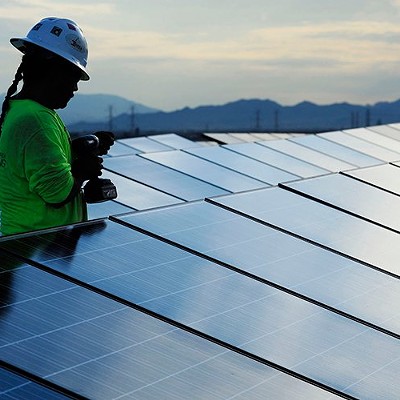Full disclosure: I had solar panels installed on my roof last summer. The whole thing cost upward of $23,000, with TEP picking up nearly $2,700 of the up-front cost. I got more than 30 percent of the rest back in various government incentives.
Did I deserve this help? Did the solar industry? I don't know. But if you think the infrastructure of this country was built by rugged capitalists with no help from government, then you, my friend, know nothing about the history of the railroads or the gas and oil industries.
So. My electric bill since then has been $7.88 a month in fees charged by TEP, until last month. For July, due to our use of the AC on a bunch of cloudy days, we exhausted the surplus kilowatts we'd generated mostly during the fall and spring—when the angle of the sun is optimal—and had to cough up $63.88. I'm not complaining. Au contraire.
However, now Arizona Public Service, the state's largest power company, has joined a nationwide movement of electric utilities and proposed that solar customers pay $50 to $100 a month for the privilege of being connected to their grids. This comes six months after Arizona slashed subsidies for solar installations. Why? Because the electric utilities are awakening from their long sleep and recognizing that rooftop solar—accounting for a quarter of 1 percent of all electricity generated in the U.S., but growing fast—is the beginning of a death spiral for their industry, and they've begun fighting its expansion hard. They've seen the future: more people and businesses get solar panels; the cost of maintaining the grid shifts to other consumers, who start thinking it might make sense to get solar; and so on. In other words, pretty much the same painful scenario we've seen with entities as varied as local newspapers and the post office.
The power guys aren't wrong—their goose will certainly be cooked if they insist on peddling the same old bird—but what struck me about the utility spokespeople's talk was its panicky, babyish tone. The very survival of our industry is at stake! Like that's an argument for raising fees? Like we should care that the idea of a clean, safe, hi-tech energy future for the nation makes utilities feel all icky?
Clearly, the lords of the electron have no idea how little their long-entrapped customers love them. And clearly, ensconced in their safe, comfortable monopolies, they've lost sight of that dynamic, ruthless, evolutionary engine called capitalism.
Change is the one constant of the world, and change happens especially fast in an industrial capitalist environment, where people who think up new things that work better than old things sometimes get rich. Centralized power generation from fossil fuel and big grids were swell new ideas 100 years ago, but their age is drawing to a close, and they've never even existed in vast parts of the world, where micro solar is taking off. And just look what burning coal has done for northern China—nearly everyone's got electricity and a job, but the population is choking to death.
The classic Econ 101 case study of technological change simply killing an industry is buggy whip manufacturers at the dawn of the automotive age. Should folks have stuck to horse-drawn carriages because the switch to cars created problems for craftsmen who made tools for smacking horses? Or should pioneering automobile owners have been taxed to support the buggy whip, wainwright, blacksmithing and livery industries in the style to which they'd been accustomed? Of course not.
Solar and wind and geothermal are not just coming; they're here. And they're the smart choice and getting cheaper. In Southern Arizona, solar is just plain obvious. And what do you think someone like me, someone who's willing to invest in rooftop solar, starts to think about when the utilities threaten her with a $100-a-month fee—more than twice what we'd pay in an average winter month when we were still buying their juice, by the way. She starts thinking about putting on more panels and looking into high-tech batteries—one of the hottest and most promising fields in all of technology today.
She thinks, in short, about telling the power industry to go screw itself. In fact, she dreams of it.




